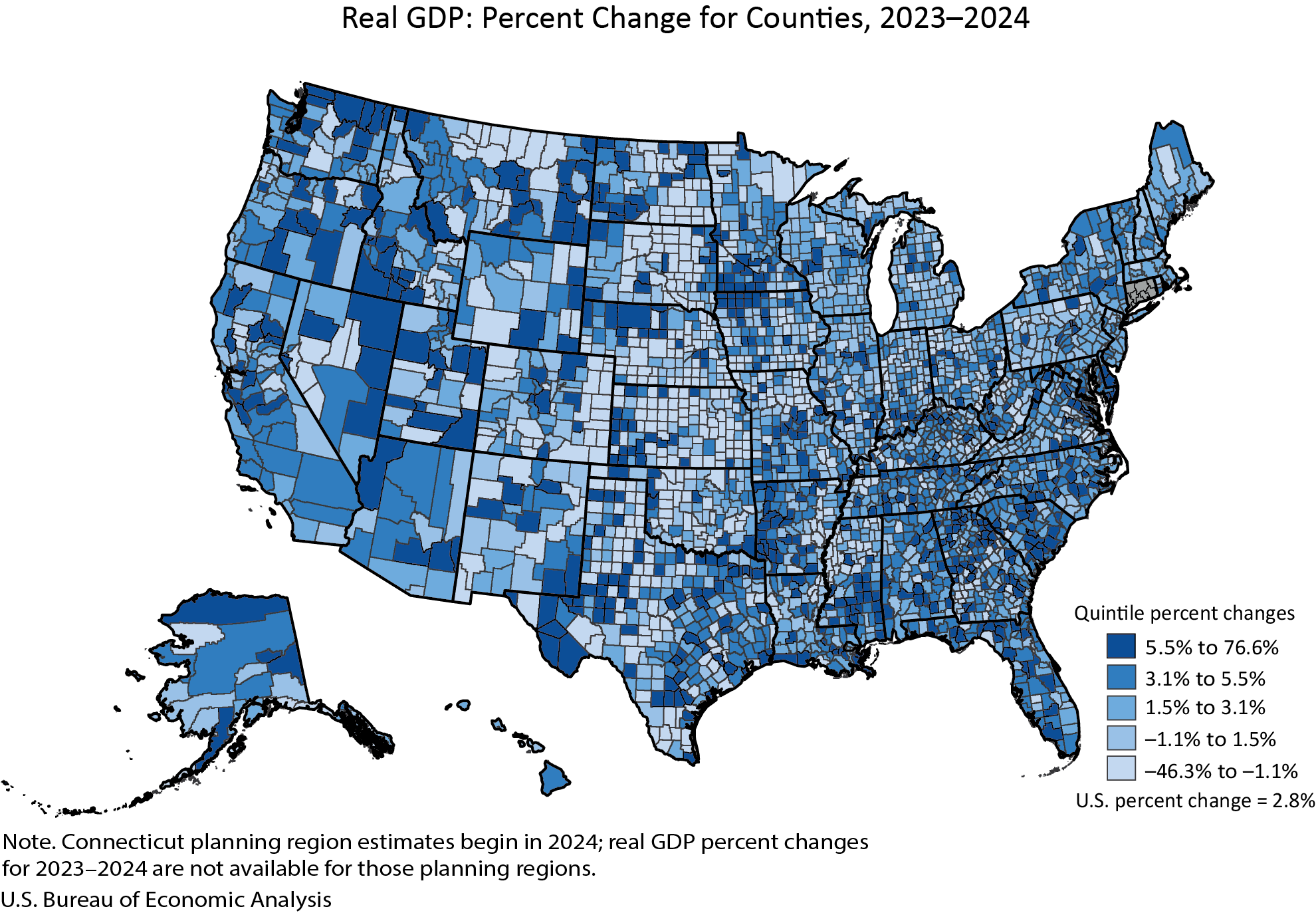Bureau of Economic Analysis
Gross Domestic Product by County and Personal Income by County, 2024
Real gross domestic product (GDP) increased in 2,273 counties, decreased in 809 counties, and was unchanged in 24 counties in 2024. County-level changes ranged from a 76.6 percent increase in Carter County, MT, to a 46.3 percent decline in Baca County, CO.
Personal income, in current dollars, increased in 2,768 counties, decreased in 331, and was unchanged in 7 counties in 2024. County-level changes ranged from a 22.6 percent increase in Harding County, SD, to a 23.3 percent decline in Issaquena County, MS.
Principal Federal Economic Indicators
Noteworthy
The Latest
Gross Domestic Product, 4th quarter and annual 2012 (advance estimate)
Real gross domestic product -- the output of goods and services produced by labor and property located in the United States -- decreased at an annual rate of 0.1 percent in the fourth quarter of 2012 (that is, from the third quarter to the fourth quarter), according to the "advance" estimate released by the Bureau of Economic Analysis.
November 2012 Trade Gap is $48.7 Billion
The U.S. monthly international trade deficit increased in November 2012, according to the U.S. Bureau of Economic Analysis and the U.S. Census Bureau. The deficit increased from $42.1 billion (revised) in October to $48.7 billion in November, as imports increased more than exports. The previously published October deficit was $42.2 billion. The goods deficit increased $6.6 billion from October to $65.7 billion in November, and the services…
Real Disposable Personal Income Turns Up in November
Personal income increased 0.6 percent in November after increasing 0.1 percent in October. Wages and salaries increased 0.6 percent in November after decreasing 0.3 percent in October. The October decrease reflected work interruptions caused by Hurricane Sandy, which reduced wages and salaries by 0.3 percent.
Personal Income and Outlays, November 2012
Personal income increased $85.8 billion, or 0.6 percent, and disposable personal income (DPI) increased $74.7 billion, or 0.6 percent, in November, according to the Bureau of Economic Analysis. Personal consumption expenditures (PCE) increased $41.3 billion, or 0.4 percent. In October, personal income increased $7.5 billion, or 0.1 percent, DPI increased $6.4 billion, or 0.1 percent, and PCE decreased $6.6 billion, or 0.1 percent, based on…
GDP Growth Accelerates in Third Quarter
Real gross domestic product (GDP) increased 3.1 percent in the third quarter of 2012 after increasing 1.3 percent in the second quarter, according to estimates released by the Bureau of Economic Analysis. The third-quarter growth rate was revised up 0.4 percentage point from the second estimate released in November.
Gross Domestic Product, 3rd quarter 2012 (third estimate); Corporate Profits, 3rd quarter 2012 (revised estimate)
Real gross domestic product -- the output of goods and services produced by labor and property located in the United States -- increased at an annual rate of 3.1 percent in the third quarter of 2012 (that is, from the second quarter to the third quarter), according to the "third" estimate released by the Bureau of Economic Analysis. In the second quarter, real GDP increased 1.3 percent. The GDP estimate released today is based on…
State Personal Income: Third Quarter 2012
State personal income growth slowed to 0.5 percent in the third quarter of 2012 from 0.7 percent in the second quarter. Growth slowed in 34 states, accelerated in 11, and was unchanged in 5. Growth across states ranged from 1.4 percent in North Dakota to –1.6 percent in South Dakota. Inflation, as measured by the national price index for personal consumption expenditures, accelerated to 0.4 percent in the third quarter from 0.2 percent in the…
State Quarterly Personal Income, 1st quarter 2012-3rd quarter 2012
WASHINGTON DC, December 19, 2012 – State personal income growth slowed to 0.5 percent in the third quarter of 2012, from 0.7 percent in the second quarter, according to estimates released today by the U.S. Bureau of Economic Analysis. Growth slowed in 34 states, accelerated in 11, and was unchanged in 5. Growth across states ranged from 1.4 percent in North Dakota to -1.6 percent in South Dakota.
U.S. Current-Account Deficit Decreases in Third Quarter 2012
The U.S. current-account deficit—the combined balances on trade in goods and services, income, and net unilateral current transfers—decreased to $107.5 billion (preliminary) in the third quarter of 2012 from $118.1 billion (revised) in the second quarter of 2012. As a percentage of U.S. gross domestic product (GDP), the deficit decreased to 2.7 percent from 3.0 percent. The previously published current-account deficit for the second quarter…




